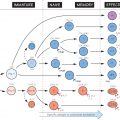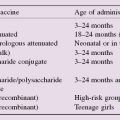The language of immunology, with its emphasis on memory, tolerance, self and non-self, is reminiscent of that of neurology; indeed, the immune system has been referred to as a ‘mobile brain’. Soluble ‘messenger’ molecules , the cytokines (see Figs 23 and 24), are used by immune cells to communicate with each other at short range across ‘immunological synapses’ closely parallelling the role of neutrotransmitters. Other long-range cytokines recall the hormone-based organization of the endocrine system, which is itself linked to the brain via the hypothalamic–pituitary–adrenal axis. Thus, it has been suggested that all three systems can be seen as part of a single integrated network, known as the psychoneuroimmunological, or neuroendocrino-immunological, system.
Evidence to support this comes from several directions. Stress, bereavement, etc. are known to lower lymphocyte responsiveness, and the same can be achieved by hypnosis and, some claim, by Pavlovian conditioning. Lymphoid organs receive a nerve supply from both sympathetic and parasympathetic systems, and the embryonic thymus is partly formed from brain, with which it shares antigens such as theta. Lymphocytes secrete several molecules normally thought of as either hormones or neuropeptides (see bottom right of figure), while the effect of cytokines on the brain is well established (see Fig. 24).
The ability of the immune system to affect neurological and endocrine function is clearly established, and has a central role in several important diseases (see opposite page). The influence of the brain on immunological function remains more controversial and immunological opinion is divided as to its significance. At one extreme are those who dismiss the connections as weak, trivial and irrelevant. At the other are the prophets of a new era of ‘whole body’ immunology, stretching from the conscious mind to the antibody molecule, which would have significant implications for medical care. A middle-of-the-road view would be that such effects are the fine-tuning in a system that for the most part regulates itself autonomously. Time will tell who is nearest the truth.
Central Nervous System
Cortex
The outer layer of the brain in which conscious sensations, language, thought and memory are controlled.
Limbic System
An intermediate zone responsible for the more emotional aspects of behaviour.
Hypothalamus
The innermost part of the limbic system, which regulates not only behaviour and mood but also vital physical functions such as food and water intake and temperature. It has connections to and from the cortex, brainstem and endocrine system.
Pituitary Gland
The ‘conductor of the endocrine orchestra’, a gland about the size of a pea, divided into anterior and posterior portions secreting different hormones (see below).
RH
Specific releasing hormones produced in the hypothalamus stimulate the pituitary to release its own hormones, e.g. TRH (TSH-releasing hormone).
Neuropeptides
Stay updated, free articles. Join our Telegram channel

Full access? Get Clinical Tree





